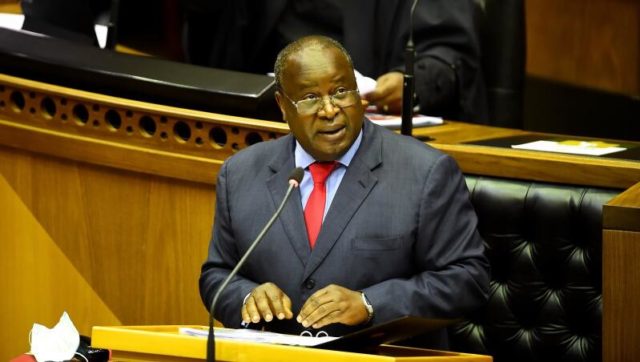The government has committed R791.2 billion over the medium term towards infrastructure investment
CAPE TOWN – THE GOVERNMENT has committed R791.2 billion over the medium term towards infrastructure investment, as the country’s dams, bridges and railway lines that have supported the economy for decades, were either in need of repair or replacement, Finance Minister Tito Mboweni said yesterday.
The economic recovery plan announced in October last year prioritised infrastructure spending to support the economy in the short term. In 2020/21, the public sector spent about R226.1bn on infrastructure, an increase of 20.6 percent over the previous year.
However, according to the Budget Review yesterday, the government does not have sufficient financial resources to meet growing infrastructure needs. Collaboration with business labour and civil society is being sought.
Mboweni said the user pays principle would be applied to infrastructure, that the projects would be financed through blended finance models, and that communities should change their thinking, so that infrastructure such as schools and police stations were not destroyed.
Examples the finance minister cited of such projects were the upgrade and expansion of the six busiest ports of entry, with the public-private-partnership model that would see the government, companies and development finance institutions working together to develop these projects.
He said “One-Stop-Border-Posts” would be developed, starting with Beitbridge between Zimbabwe and South Africa, which was built in 1929, and last upgraded in 1995.
According to the Budget Review, road infrastructure was the largest spending programme in the infrastructure development function.
Total expenditure was expected to grow annually at 8.2 percent from R86.5bn in 2020/21 to R109.5bn in 2023/24, largely due to underspending on these projects in 2020/21.
Adding to the outlook for further infrastructure development, all government capital programmes had been protected from budget reductions.
Spending on national water resource management was expected to grow from R28.6bn in 2020/21 to R30bn in 2023/24. Planned water expenditure over the medium term included phase 2 of the Lesotho Highlands Water Project and the Mokolo Crocodile Water Augmentation Project.
Capital investment by the public and private sectors amounted to 17.9 percent of gross domestic product (GDP) in 2019, but this needed to increase.
Public finances had deteriorated, mainly due to low growth and tax revenue, and the need for increased support for state-owned companies. This had threatened the government’s ability to invest in new infrastructure.
The National Development Plan, however, targets capital investment of 30 percent of GDP.
“To reach that goal, public-sector investment will need to grow from 5.4 percent of GDP in 2019 to 10 percent by 2030, while private-sector investment in infrastructure would need to grow from 12.5 percent of GDP in 2019 to 20 percent in 2030,” the National Treasury said.
State-owned companies would be the largest contributor to capital investment, spending a projected R293.7bn over the next three years.
Provinces were expected to spend R181.9bn on infrastructure over the same period, while municipalities were forecast to spend R190.8bn.
Public housing built through the human settlements development grant in provinces was expected to total R41.7bn.
Spending on economic infrastructure, mainly by State-owned companies, accounted for 78.2 percent of the medium-term estimate. These funds were being used to expand power generation, upgrade and expand the transport network, and improve sanitation and water services.
Social services infrastructure accounted for 18 percent of the total, of which health and education account for 5 percent and 7 percent, respectively.
The government was transforming its approach to the planning and implementation of capital projects, bringing in more private-sector expertise, while increasing the resources available to fund infrastructure.
The Department of Public Works and Infrastructure is working with the Infrastructure and Investment Office in the Presidency to build a pipeline of infrastructure projects.
Fifty strategic integrated projects were gazetted in 2020 in terms of the Infrastructure Development Act, with an estimated combined capital investment value of R340bn.
To achieve water security, South Africa needed to close an estimated capital funding gap of about R33bn a year for the next 10 years through cost-reflective tariffs.
At present, governance structures were weak, cost recovery was low, and institutional and regulatory frameworks were inadequate.
Eleven strategic water projects of about R105bn had been prioritised, and were expected to create about 20 000 temporary jobs during construction and 14 000 jobs when operating.
Projects ready for investment include: Lesotho Highlands Water Project Phase 2, uMkhomazi Water Project, Berg River Voëlvlei Augmentation Scheme, and Mokolo Crocodile River Water Augmentation Project Phase 2.
Three energy projects had been gazetted: the Emergency/Risk Mitigation Power Purchase Procurement Programme, the Small Independent Power Producer Programme and the Embedded Generation Investment Programme. These would create 2 569 megawatts of electricity generating capacity. Total investments, to be funded by the private sector, amounted to R52.4bn.
The transport sector had 15 gazetted projects worth R47bn.
The South African National Roads Agency Limited would develop 13 roads projects worth R19bn, which would create nearly 10 000 jobs during construction.
The Small Harbours Programme, which sought to revitalise harbours in the Western Cape and develop new harbours in the Northern Cape, Eastern Cape and KwaZulu-Natal, was expected to create 5 750 jobs.
Human settlements projects include six Integrated Residential Development Programmes, 10 social housing projects and two large-scale privately led developments.
The 18 projects gazetted had an investment value of R129bn and would provide housing for more than 170 000 people. These projects were projected to create more than 358 000 jobs during construction and more than 55 000 jobs during operation.
BUSINESS REPORT








